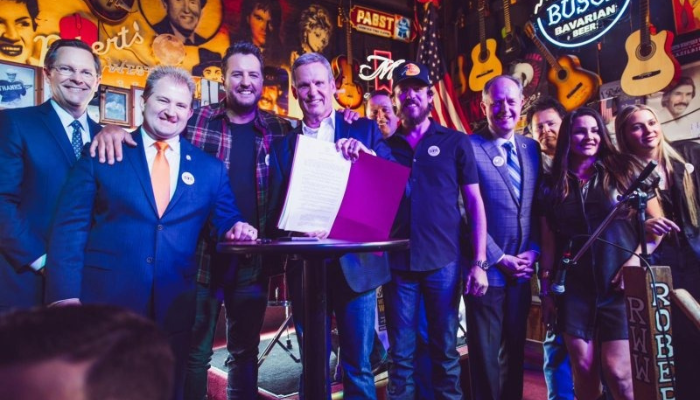Tennessee first to shield musicians from AI
3 min read
The legislation aims to safeguard music industry professionals from unauthorized replication of their intellectual property
Tennessee Governor Bill Lee approved legislation on Thursday aimed at shielding songwriters, performers, and other music industry professionals from the potential risks posed by artificial intelligence.
This action establishes Tennessee, renowned for its association with country music and the rise of musical icons, as the first state in the US to implement such protections. Advocates assert that the aim is to prevent AI tools from replicating an artist’s voice without their permission. The law will come into effect on July 1st.
Governor Lee explained to reporters shortly after signing the bill that Tennessee employs more individuals in the music industry than any other state. He emphasized that artists possess intellectual property, unique gifts, and an individuality that belongs solely to them, not to artificial intelligence.
Only two other states besides Tennessee regard names, photographs, and likenesses as property rights rather than rights of publicity. According to the newly enacted law, named the Ensuring Likeness, Voice, and Image Security Act or “Elvis Act,” vocal likeness will now be included in that category.
However, the legislation’s effectiveness in protecting artists’ work from being scraped and duplicated by AI without their consent is still uncertain. While supporters such as Lee acknowledged the broad support from within the music industry and the unanimous approval from the Tennessee statehouse, the effectiveness of the legislation remains unproven. This level of bipartisan agreement is a surprising anomaly amidst ongoing conflicts between the GOP supermajority and a small number of Democrats.
Many musicians in Tennessee argue that they cannot afford to wait for a perfect solution, noting that the threats of AI are already evident on their cellphones and in their recording studios.
“I receive material on my phone that sounds exactly like me,” stated country star Luke Bryan. “It’s a genuine issue now, and hopefully, this legislation will help curb and slow it down.”
The Republican governor chose to sign the bill at the heart of Nashville’s Lower Broadway, inside the crowded Robert’s Western World. The venue is frequently filled with tourists eager to enjoy traditional country music.
The decision to name the newly enacted law after Elvis Presley was not just a tribute to one of the state’s most iconic residents.
Presley’s death in 1977 sparked a contentious and protracted legal dispute over the unauthorized use of his name and likeness. Many argued that once a celebrity passed away, their name and image became part of the public domain.
However, in 1984, the Tennessee legislature passed the Personal Rights Protection Act, which clarified that personality rights extend beyond death and can be inherited. The act specifies that “the individual rights… constitute property rights and are freely transferable and licensable, and do not expire upon the death of the individual so protected.”
This legislation was widely viewed as crucial for safeguarding Presley’s estate. Over the decades, it has also been praised for protecting the names, photographs, and likenesses of all public figures in Tennessee.
Now, Tennessee will extend these protections to include vocal likeness.



